 For this gem of an attitude that was commonplace during the time of Messiah, we have to talk about the members of the “synagogue of Satan” – the Pharisees of the House of Shammai.
For this gem of an attitude that was commonplace during the time of Messiah, we have to talk about the members of the “synagogue of Satan” – the Pharisees of the House of Shammai.
I talk about this in great detail in my newest book King, Kingdom, Citizen: His Reign & Our Identity, but I will only briefly touch upon it here.
In the decade before the birth of Messiah, the Pharisees of the House of Shammai came to be in control of the Sanhedrin Council (the Jewish Supreme Court of ancient times). These snakes and vipers, as John the Baptist referred to them, had enacted the Eighteen Edicts of Shammai – civil laws that practically forbade relations between the Jews and Gentiles, effectively keeping Gentiles from being able to worship the God of Abraham, Isaac and Jacob. The Pharisees of the House of Hillel, who were pro-Gentile conversion, called the enactment of these laws as egregious as the building of the golden calf at Sinai! The Shammai Pharisees were shutting up the Kingdom of Heaven to seekers and not even going in themselves!
This is a woefully inadequate rendering of the backstory to Acts 10, but will give you a window of understanding into why Peter thought it was illegal to go into the home of a Gentile or eat with them in verse 28:
“And he said unto them, Ye know how that it is an unlawful thing for a man that is a Jew to keep company, or come unto one of another nation; but God hath shewed me that I should not call any man common or unclean.”
In fact, the entire vision the Peter had in the early verses of Acts 10 had nothing at all to do with food, but with the Shammai ruling that any clean animal that is touched by an unclean animal is rendered common, and no longer fit for eating. This extended to people as well, and any Jew who came in contact with a Gentile would supposedly become common and ritually unclean. Of course, this is not Biblical in the slightest – it is in fact patently anti-Biblical. The Israelites were commanded to be a light to the Nations so that all the world would worship God, YHVH! Without contact between Jew and Gentile, however, the gospel was stopped dead in its tracks (okay, when I spelled that the first time I said tracts instead of tracks and that is funny because, you know, people hand out gospel tracts… never mind).
Not only are we not to call people unclean, but to be unclean is in no way an insult when seen in context! It is simply a temporary disqualification from going to the Temple. Ritual uncleanliness is the natural consequence of sexual relations, the female menstrual cycle, childbirth, and skin diseases. Although the last of the four is lamentable, the first two are actually generally required for the third, which is pronounced to be a blessing.
And so, the next time you see someone call another person unclean – why not go ahead and ask them if they are card-carrying members of the House of Shammai, or maybe just aspirants for membership in the synagogue of Satan – or maybe just avoid them altogether, because if they don’t know that very basic scriptural prohibition, then they really have no business rebuking anyone at all. The Holy Spirit weighed in on this subject almost 2000 years ago. This insult is off-limits.
I mean really, if generally over-talkative me can debunk an insult this briefly, you know it’s ridiculous.





















One of the more succinct explanations. Thank you, well done. 🙂
What about when one accidently consumes pork or another food that disobeys Lev. 11? They are just unclean until evening, I know; therefore they could not go to the temple, right?
Tammy, no – being unclean is different from transgression. We must repent, and a sin offering would be required at the Temple. In those days, it would have been impossible to accidentally eat unclean meats. Uncleaness results from natural body functions, and as not sin – there is no transgression involved. The only exception to that rule is when a man has sexual with a woman during her menstrual cycle, and then he is unclean 7 days same as her. If it is accidental, then it is a simple transgression, but if it was on purpose then it was purposefully committing an abomination.